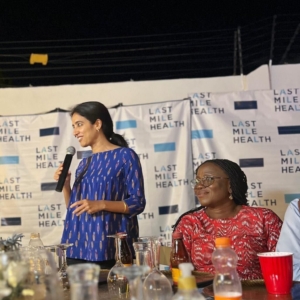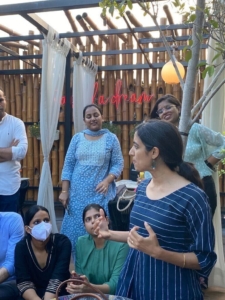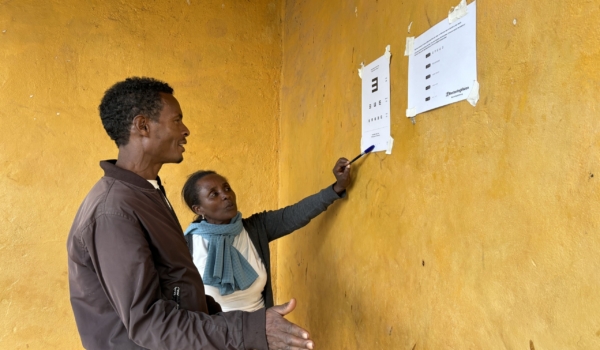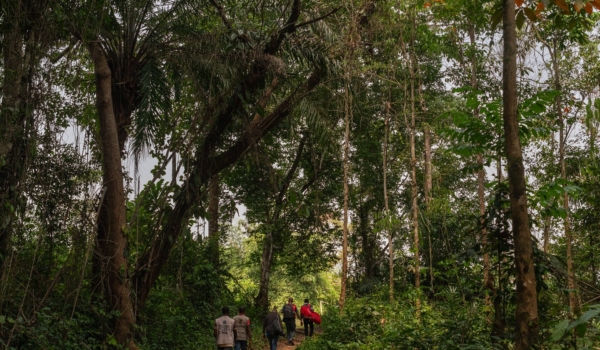Last Mile Health is thrilled to announce that Divya Nair has joined the organization as Chief Technical Officer. She comes to our leadership team with nearly 20 years of experience in public health and public policy, including a wealth of experience in engaging with ministry partners and donors. “Divya brings rich experience in evidence-based design of primary health solutions, measurement and evaluation, and digital capacity-building within public sector systems,” said Last Mile Health CEO Lisha McCormick. “She is the type of leader who thinks collectively and helps all who surround her to be their best—thus making LMH smarter, stronger, and more impactful.”
One month into her new role, our communications team spoke with Divya about what brought her to Last Mile Health, what excites her about her position, and the change she hopes to see in public health.
Last Mile Health communications team: Chief Technical Officer (CTO) is a new position at Last Mile Health. Can you describe your most important functions in this role, and how they’ll contribute to our work and mission?
Divya Nair: We’ll be focusing on bringing key technical functions together and coming up with a compelling vision for success—what are our goals, and what’s the best way of setting up our teams? Immediately, we’ll be looking at digital health strategy, how we can leverage public finance for funding community health systems, and understanding the gaps in knowledge—where can we come together to improve the quality of what we’re providing?
LMH: You’ve shared that this role is your “dream job.” Can you tell us more about why you’re excited to be joining us in this capacity?
DN: I really do think it’s my dream job! I have a PhD in public health and public policy, and I’ve always been inspired by evidence of transformational initiatives that can substantially improve the lives of the poorest, in their communities. My work in India [most recently as a senior director with IDinsight], especially during COVID-19, really showcased the reach, reliability, and power of community and frontline workers in providing a range of critical services. India has almost 3 million frontline health workers, and they are the backbone of health and nutrition services, but there are also a lot of gaps in the way they are supported. So to be able to work directly with a very thoughtful and purpose-driven organization like Last Mile Health on strengthening community health systems really excites me. Another key part of what motivates me is Last Mile Health’s deep commitment and history of working closely with governments and the public sector to ensure integration, sustainability, and scale.
LMH: You come to Last Mile Health with a wealth of experience in engaging with ministry partners and donors. What makes partnership essential to systemic change?
DN: I believe systemic change, and the complex problem-solving needed for it, is impossible without deep partnership and trust across many actors. Partnership with governments is key for scale—but to ensure sustainability, we also need partnership with civil society and with donors. Developing a sense of trust, assessing the comparative advantage of each party, allows you to have more strategic and tactical partnerships and make progress on the common goals you’re setting out to achieve.
LMH: Your role will be based in our new global office in Accra, Ghana, which was launched in 2022 to move centers of power and decision-making closer to our programming. Why is it critical for organizations with programs in Africa to shift their centers of power to the continent?

Last Mile Health Leadership Council, including Divya (back row, second from left), during a retreat in Accra, Ghana.
DN: There’s a lot of conversation happening about decolonization in public health. But actually shifting the power, having the decisions come from those with the most context and from those who are accountable to end-users of the programming, will help to build more effective systems with greater ownership. What communities want should be front and center when designing services. The time has long come for this shift, to actually enable change.
LMH: In your opinion, what are the biggest unmet challenges in the community health field?
DN: I’m really impressed that our Six Ss have been adopted by the wider health community. That’s a great step in terms of acknowledging what’s needed, but achieving it is something we’re a long ways from. For example, setting up supply chains—that’s a big challenge for community health workers. We seem to be making progress on salaries, but that also varies across different countries. There’s a lot of excitement around setting up digital systems and collecting data, but actually using data to inform actions and to inform change at the national level is something I hope we can meaningfully work on in the coming years.
LMH: How can Last Mile Health’s approach—strengthening community health systems through government partnerships, and upskilling paid, professional community health workers to deliver primary care—help to address these and other challenges?
DN: We’ve already shown that it does work—we have evidence in terms of a range of interventions and health outcomes—but I think what hasn’t happened is bringing all of these pieces together within large programs. Hopefully, through initiatives like Africa Frontline First, we can really scale up some of our learnings. I hope we continue to have this learning mindset to collect information on what’s working and what’s not.
LMH: What makes paid, professionalized community health workers an especially powerful tool for realizing universal health coverage (UHC)?
DN: Looking at the number of people who don’t have access to care, there’s a long way to go before we can claim any kind of success in achieving UHC. I think scaling up community health systems is the only way forward, because it’s the most cost-effective way to ensure everyone has access to care. It’s an urgent issue right now, and what’s exciting about this time is there’s acceptance that the community health workforce is the way to provide care—and now it’s about how to make that happen.






